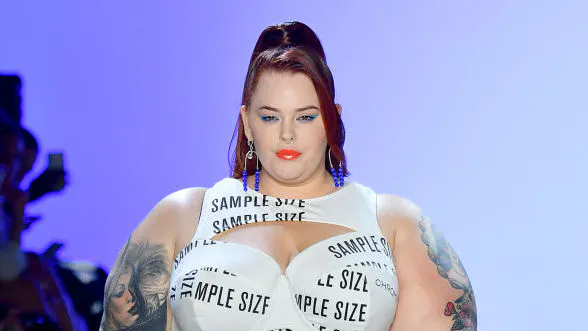Plus-size model and fat activist Tess Holliday revealed last week that she has anorexia and is in recovery.
“I’m anorexic & in recovery,” Holliday wrote to Twitter on May 1. “I’m not ashamed to say it out loud anymore. I’m the result of a culture that celebrates thinness & equates that to worth, but I get to write my own narrative now. I’m finally able to care for a body that I’ve punished my entire life & I am finally free.”
I’m anorexic & in recovery. I’m not ashamed to say it out loud anymore. I’m the result of a culture that celebrates thinness & equates that to worth, but I get to write my own narrative now. I’m finally able to care for a body that I’ve punished my entire life & I am finally free
— Tess H🍒lliday (@Tess_Holliday) May 1, 2021
When folks online questioned Holliday’s eating disorder, noting that she’s obese, the model wrote a post claiming her detractors “don’t know science.”
“Not the ‘but your [sic] fat how are you anorexic’ comments. Y’all don’t know how science & body works huh. My technical diagnosis is anorexia nervosa & yes, I’m still not ashamed. I’m too damn happy for y’all to even come close to dimming my shine.”
Not the “but your fat how are you anorexic” comments. Y’all don’t know how science & body works huh. My technical diagnosis is anorexia nervosa & yes, I’m still not ashamed. I’m too damn happy for y’all to even come close to dimming my shine.
— Tess H🍒lliday (@Tess_Holliday) May 2, 2021
Responding to criticism concerning Holliday’s “body acceptance” activism, she said, “To everyone saying that I can’t possibly love myself and have an eating disorder, that is the actual definition of loving myself. Being able to prioritize myself & to be in recovery. I’m more self aware than any of my critics but you know, y’all go off.”
To everyone saying that I can’t possibly love myself and have an eating disorder, that is the actual definition of loving myself. Being able to prioritize myself & to be in recovery. I’m more self aware than any of my critics but you know, y’all go off.
— Tess H🍒lliday (@Tess_Holliday) May 2, 2021
In an Instagram post, Holliday similarly talked about her weight and scolded people who tell her she’s “looking healthy lately.”
“To everyone that keeps saying ‘you’re looking healthy lately’ or ‘You are losing weight, keep it up!’ Stop. Don’t. Comment. On. My. Weight. Or. Perceived. Health. Keep. It. To. Yourself. Thanks.”
“Yes, I’ve lost weight — I’m healing from an eating disorder & feeding my body regularly for the first time in my entire life,” she continued. “When you equate weight loss with ‘health’ & place value & worth on someone’s size, you are basically saying that we are more valuable now because we are smaller & perpetuating diet culture… & that’s corny as hell. NOT here for it.”
“For folks like me that are trying to reframe our relationships with our bodies & heal, hearing comments about weight is triggering as hell,” she said. “It sets us back in our progress — and when people working on themselves see you commenting to me that way, it hurts THEM, not just me. I can take it (I shouldn’t have to, but I can) but they didn’t ask for that trauma, ok? If you can’t tell someone they look nice without making it about their size, then baby, please don’t say nuthin at all.”
View this post on Instagram
As noted by AdWeek, Holliday founded the “body positivity” “Eff Your Beauty Standards” movement back in 2013 and holds huge influence, racking up millions of followers on social media and working with brands like H&M, Benefit Cosmetics, eBay, and ModCloth.
Chelsea Kronengold, associate director of communications at the National Eating Disorders Association, told PEOPLE magazine that Holliday, though she is obese, can be suffering from anorexia:
People with anorexia experience “weight loss or difficulties maintaining a ‘appropriate’ body weight for an individual and their medical history,” Kronengold tells PEOPLE. “It involves restricting foods or calories, and it can affect people across all demographics, so it can affect people of all ages, races, genders, sexualities, socioeconomic status, abilities and even body weight and size.”
“Eating disorders aren’t about weight. And quite frankly, they’re not even necessarily about food,” she says. “They are mental illnesses that are biological, psychological, and social in the way that they develop. And so food is really that mechanism that someone is using to either restrict or binge as a form of control and to cope with emotions, including trauma.”
H/t Evie Magazine

.png)
.png)

